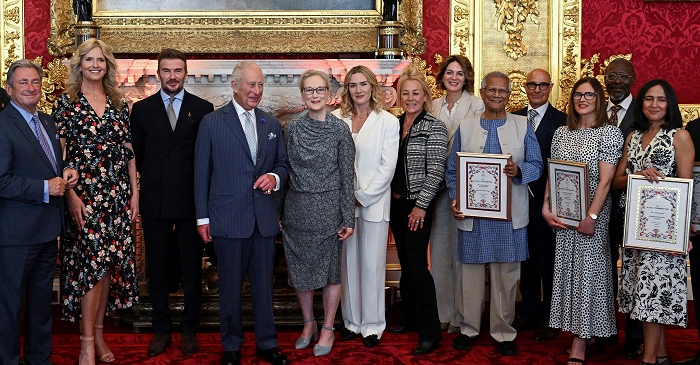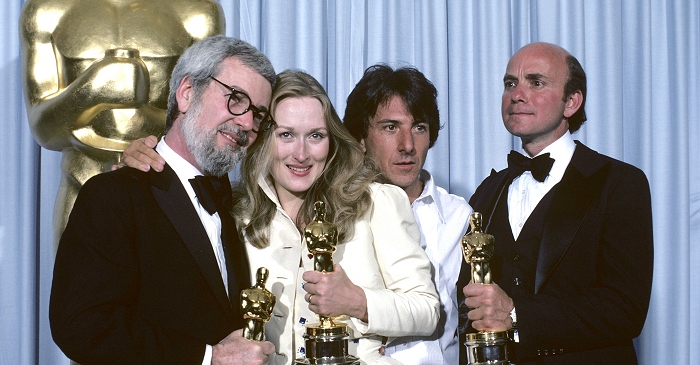|
Simply Streep is your premiere online resource on Meryl Streep's work on film, television and in the theatre - a career that has won her acclaim to be one of the world's greatest living actresses, winning three Academy Awards for "Kramer vs. Kramer", "Sophie's Choice" and "The Iron Lady". Created in 1999, Simply Streep has built an extensive collection over the past 25 years to discover Miss Streep's body of work through thousands of photographs, articles and video clips. Enjoy your stay and check back soon.
|
|
Hail to the Streep
The Boston Globe ·
July 25, 2004
|
Streep plays the role Angela Lansbury did in the 1962 original. In this version, her character has gone from political wife to US senator. A very formidable US senator: One look at Streep would put a stop to Arnold Schwarzenegger’s talk about “girlie men” legislators. Being a senator is, in a sense, a demotion for Streep. She long ago earned the unofficial title “First Lady of American Film” – and she has a record 13 Oscar nominations to prove it. She’s won twice, as best supporting actress for “Kramer vs. Kramer” in 1980, and three years later as best actress in “Sophie’s Choice.” Streep’s grande-dame status is both an honor and a burden (being put on a pedestal’s not so different from being put on the shelf). It’s also a paradox. In person, there’s nothing grande about Streep’s dameness. She’s smart. She’s vibrant. And a frequently heard girlish giggle leaves her at a severe disadvantage in the putting-on-airs department. Curled up in an armchair in a Manhattan hotel suite, Streep talks about her career with an engineer’s matter-of-factness. With her glasses on, she even looks a bit like an engineer, assuming engineers wear knee-length floral-print jackets and have such peaches-and-cream complexions.
Streep hoots when asked about her museum-quality reputation. “It’ll be great when I die,” she laughs. Streep, who turned 55 last month, is too busy to die any time soon. Later this year, she appears as Aunt Josephine in “Lemony Snicket’s A Series of Unfortunate Events,” based on the popular series of children’s books. She has another five film projects in various stages of production, including the Jodie Foster-directed “Flora Plum.” For at least a decade, Streep had continued to pile up Oscar nominations even as she came to seem increasingly peripheral to what was happening in Hollywood. She may not have been on automatic pilot, but her persona was. Then, in late 2002, came the one-two punch of “Adaptation” and “The Hours.” The former earned her an Oscar nomination for best supporting actress. She was even better in the latter. Since then, Streep’s been on a roll. Her multiple parts in HBO’s production of “Angels in America” just earned her an Emmy nomination for best actress in a miniseries. Last month, she became only the sixth female recipient, and third youngest, of the American Film Institute’s Life Achievement Award.
Does it feel to Streep as though this has been a particularly good time for her? “It does,” she says, extending the second syllable until it does the work of an entire sentence. The sentence almost – almost – becomes a question. “Yes,” she finally exhales. “It’s bewildering. I always thought I’d be washed up at 40. That’s the way it is for most leading actresses. I’ve been lucky. I’m not unaware of the fact that some of my biggest jobs recently have come as a result of women being the head of studios. Amy Pascal was at Sony when Spike Jonze said he wanted me to play the part of Susan Orlean [in `Adaptation’]. I was 52 years old. They could have asked for a 32-year-old. I can’t help thinking that if a man had been running that studio they would have asked Cate Blanchett. That was Amy. Same with Sherry Lansing.” Lansing heads Paramount, which coproduced “The Hours” and is producing “Lemony Snicket” and “The Manchurian Candidate.”
The issue of women and power looms large in “Candidate.” The title character, Raymond Shaw (Liev Schreiber), is not just a major-party vice-presidential nominee but also Streep’s son. The power she wields as senator is nothing compared to the power she wields as mother. With considerable glee, Streep confesses to having come up with that “Where are the men” line. Conversely, she dismisses speculation that she modeled her performance on Hillary Rodham Clinton. There’s a definite similarity in haircut and clothes sense, Streep agrees, but neither is unique to Clinton. “This is a generic political hairdo a lot of people have, just because they have to work,” she says. “Laura Bush has this hairdo. Liddy Dole has it. Dianne Feinstein used to have this hairdo. Basically, there’s just so much you can do when you have to be photographed all the time. That’s the way they are. Everybody – everybody – wears two earrings, a pin – and not black.” She laughs. “So already this is different from almost every other character I’ve ever played.” In her first scene, Streep wears a pantsuit that’s a shade of green somewhere between lime Gatorade and radioactivity. She cites it as standard female-politician couture. “Pastels are the very favorite because people, I guess, understand that kind of clothing. You dress for the voters. Understand that. You can’t come on with the big amber necklaces and the Indian earrings. No. Do that and you’re not going to get elected to anything. So they dress the way they have to dress, they talk the way they have to talk, they appear the way they have to appear to inspire the confidence of the electorate.”
Streep’s character, Eleanor Shaw, poses a special challenge on two fronts. As a politician, she is herself a kind of performer. And while the film never reveals her party affiliation, it’s plain her highly conservative politics bear little resemblance to Streep’s own. “It’s a very particular kind of performance that politicians do,” Streep says, “a very particular dance. It’s the dance of certainty. Actors always are looking for ways to show their vulnerability, the contending, contradictory impulses that pull one way and another. This character was fun precisely because she lacks those things. She’s an ideologue; she lives in the world of certainty. When you have all the laws so clearly set up for yourself, you can be buoyant. That’s how I saw her, as a buoyant, jolly character the way many people are that I’ve observed in political life. Pundits prize presidents – or anyone in politics – with that kind of can-do optimism. There’s just a lack of neurosis apparent. “Of course,” she adds with a sly grin, “some people would say that kind of certainty is another kind of neurosis.” Streep downplays any ideological difficulty playing Senator Shaw. “You don’t really hear much of her politics,” she says. “It was sort of interesting to skirt a line with her, because the movie’s not a polemic. We really don’t hear her spout anything about her relationship with Jesus or that people should pull themselves up by the bootstraps. Whatever the tropes are on the right, she’s not that. We don’t hear what it is she is, we just know who she’s tied in to.”
Mere transcription doesn’t do justice to Streep’s conversation. It’s a series of constant modulations that elude punctuation and typography. Consider that italicized “interesting.” How to convey the half-laughter it contains, the blend of irony and enthusiasm? Streep uses her voice with the relaxed ease of rain falling – the transparency of wind. We tend to think of the great actorly voices as English – Gielgud’s, Olivier’s, Guinness’s – but what we respond to in their voices is the absence of naturalness, the perfection of artifice, the way the music calls attention to itself. Streep’s use of her voice couldn’t be more different. There’s a sense in which she disappears in her own voice. You don’t so much hear it as feel it. That’s her speaking voice. Her acting voice is another matter. For one thing, it tends to be plural. If the silent-era star Lon Chaney was the man of a thousand faces, then Streep is the woman of a thousand accents. The single most memorable moment in her career may be the nearly sublime delicacy with which she deploys her Polish accent in “Sophie’s Choice” to transform (in a way unprintable in this newspaper) the first four letters in “seersucker suit.” Streep is aware of her chameleonic quality. That’s one reason she refused to watch the original “Manchurian Candidate” until after finishing the new version. “I loved her performance,” Streep says of Lansbury, calling her acting “my favorite thing in the whole movie.” All the more reason, then, for her to have avoided it beforehand. “I’m such a mimic,” Streep says, “I thought I’d take little things or steal things or I would react in some way to that performance.”
Still, Streep’s gift for mimicry is but one element in her gift for acting. Can she say what it is exactly about acting that appeals to her? For once, this forthright, extremely articulate woman seems at a loss. Finally, she attempts an answer. “I’m sure it has to do with working out private passions that are almost inscrutable to me. I’ve never been in analysis and I don’t want to go there. But I just get to work out all my murderous thoughts and my weaknesses and my failures and things I don’t want to do as a parent or work out on the family. It’s better to take them here [acting]. I need it as an outlet. I love it. It feeds my imagination. It connects me to understanding – if you’re talking about a life journey – to understanding other people: what it means to be alive, what it means to be you, not just me, you. That’s interesting to me. Always has been.”










